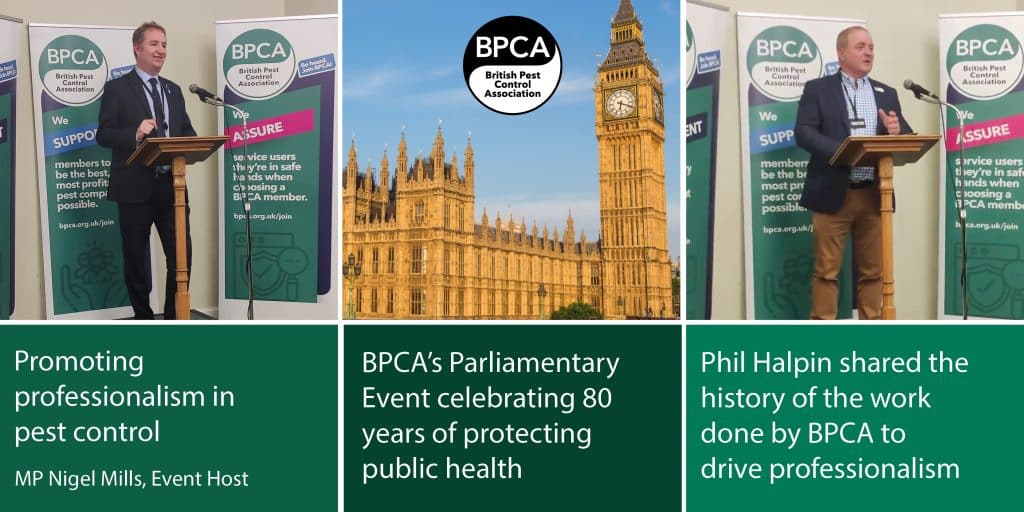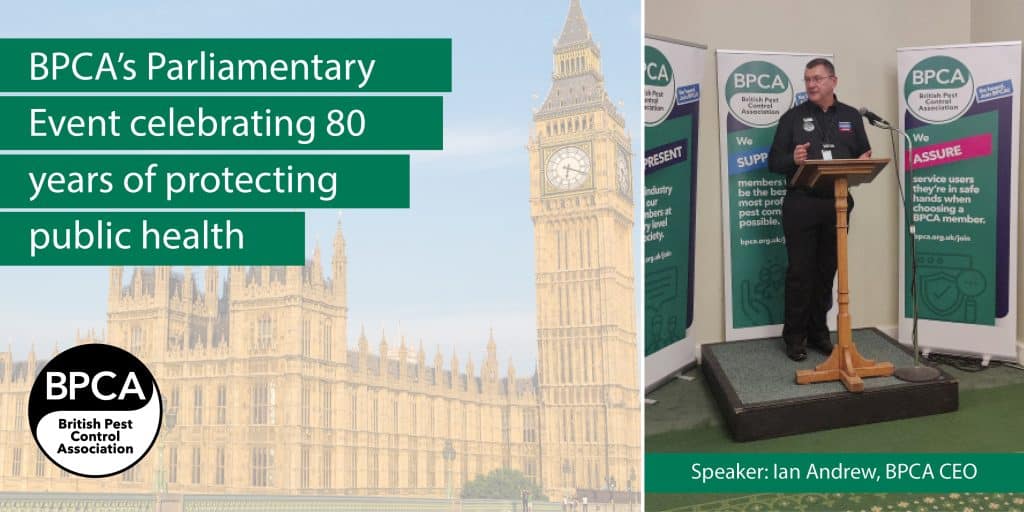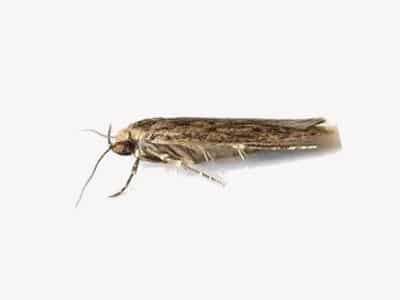On the 16th of March, the British Pest Control Association (BPCA) celebrated its 80th anniversary with a special industry event. Since 1942, BPCA, the pest control industry’s premier trade association, has been supporting its members as they protect the public health of the nation from a swathe of different pest issues and has grown tremendously as an industry.
An anniversary reception was hosted for the BPCA by MP Nigel Mills at the Churchill Room in the Houses of Parliament. The industry looked back at both its past achievements and the future of pest management. Pest Solutions Graduate Technician Gemma Sutherland gave a speech alongside MPs and Industry Experts. She shared her experience as a young female graduate technician in the Pest Control Industry in her remarks.

Gemma was joined by other speeches from MP Nigel Mills, MP Paul Scully (Minister for Small Business), President of the BPCA Philip Halpin, and BPCA CEO Ian Andrew. The BPCA celebrated 80 years of providing professional pest control and its many achievements over the last 8 decades – while also looking towards the future.
Over the last 80 years, the BPCA has made major contributions to the health and safety of the British population and made huge contributions to the development of the professional pest control industry in the UK and worldwide. The BPCA has worked hard to nurture expertise and skillsets – instilling strong consumer confidence in its member’s ability to manage the risk of pests – acting as an example of effective regulation in the marketplace – especially among small businesses.
The BPCA was founded back in 1942 – but not as BPCA. Its initial name was the Industrial Pest Control Association. Its founding was an informal meeting – with the Industrial Pest Control Association working to ensure the preservation of important food stocks (so often threatened by pests) during the Second World War. The organisation has come a long way since then; in 1963, the BPCA held its first Pest Conference, while in 1969, it finally adopted the name ‘BPCA’.

1969 was when the BPCA began to properly introduce its training and internal codes of practice. This was a response to the collapse of existing legislation for pesticide safety. The BPCA began to develop its training schemes, strict codes of practice, and examinations and qualifications. These would be recognised by the government as qualifications, and over the years, the BPCA had helped the introduction a whole swathe of vital qualifications and legislation for health and safety.
The BPCA has made many vital contributions to improving public health in the UK. One of the most important is British hospitals’ health and safety standards. In 1985 the BPCA began its ‘Hospitals Can Damage your Health Campaign’ – headed by former BPCA President Peter Bateman. The campaign revealed the serious failings of UK hospitals when it came to basic food hygiene (which had resulted in fatal outbreaks). As a result of the campaign, the NHS was forced to ensure hospitals adhered to strict safety standards.
From the 1980s onwards, the BPCA established important training and qualifications – such as the BPCA Training and Certification Scheme for pest control and fumigation. In 1993 the membership audit scheme was brought it, while the BPCA had produced the first issue of its industry magazine PPC (Professional Pest Controller Magazine) – which continues to this day. The training was further expanded in 1999 with the ‘British Pest Control Training brand’ – increasing the number of courses offered.
The BPCAs commitment to professionalism has never faltered; in 2012, membership criteria were strengthened – with further expectations on relevant qualifications. In 2016, the BPCA established its mission and vision – to drive excellence in pest management while driving forward the highest standards and ethics while protecting the environment.
The BPCA and pest control industry has much to celebrate – having contributed a huge amount to public health while championing higher standards of training and professionalism.
But the 80th-anniversary reception wasn’t just looking at the industry’s past – it was also considering the future and where the industry can and needs to go moving on. When looking to the future, one of the biggest questions is how to bring more young people into the industry? Another important question is how can more women be brought into the industry?
This is one major area the pest control industry is increasingly interested in; Pest Control has long been a male-dominated one, and expanding the number of women in the industry (a huge part of the modern workforce) is vital to ensure the industry maintains access to talented workers and vital skillsets.
Compared to both the global workforce and UK workforce, the pest control industry has lagged in terms of women in the workforce. Traditionally, pest control has been seen as a male-dominated profession – and in terms of the actual make-up of the industry, this isn’t an unfair judgement. According to BPCA, Only 4.5% of the BPCA Registered members are women, whereas 40% of the global workforce and 49% of the UK workforce are women (and this figure is growing; the UK workforce was only 47% women in 2019). While 4.5% does represent a growth since 2020 (where it was only 4%), it remains low. Failing to draw more women into the industry means a serious loss of potential talent – cutting the possible number of recruits in half. Women have a huge amount to offer the pest control industry.
Gemma Sutherland, a Graduate Service Technician at Pest Solutions, gave a speech about these issues at the parliamentary event.
A Zoology Graduate from Glasgow University, Gemma joined Pest Solutions in January 2021 and excelled, winning the ‘2021 Young Pest Controller of the Year’ in the Pest Solutions company awards and has already built up extensive experience in the industry gaining over 100 BPCA Registered CPD points in 2021 and achieving the Level 2 Award in Pest Management.
She is currently working toward sitting the Certified Advanced Technician exam as soon as she becomes eligible after 18 months served in the industry.
In her speech, Gemma shared:
“While many biases and misconceptions exist in the public regarding women in the pest control industry – especially regarding the kind of skills and education required by the work, Gemma highlighted the extremely rewarding nature of the work and that the role of a professional pest controller is far more complex and engaging than ‘rat-catching and bait laying’. This traditional image of pest control work must be changed to attract more professional young people and women into the industry.
Pest control is engaging work that requires skills such as communication, empathy, multitasking, a wealth of knowledge and integrity, and respect for the pest animals themselves. It isn’t work for everyone – but it’s by no means work for a particular sex. There is also an importance of environmental consciousness – the toolkit of pest controllers is constantly adjusting – a necessity given the environmental concerns. Pest Control, as a result, is an industry which values critical thinking and compassion – and has a wealth of opportunities for young people. It is vital for the Pest Control Industry to advertise its support for diversity and work to adjust public preconceptions and biases regarding the work of pest controllers.”
Gemma’s speech received resounding support from all present at the event. At Pest Solutions, we are proud of Gemma and the rest of our team of professionals who strive to look after our customers and protect public health every day.
As a business, Pest Solutions policy to encourage the best young people and more women to consider a career in the industry has proven highly successful. Compared with the 4.5% industry average, 36.3% of our servicing staff are women. This is despite the heavy male domination of the recruitment pool. Many of our female staff members have received recognition in industry awards, such as our own, Gabrielle Hogg winning the UK National Pest Awards 2021 “Young Technician of the Year”.
This has been achieved not by specifically trying to recruit women but instead by recruiting the best possible talent regardless of gender. The objective has been to identify the best skills in potential recruits and invest in training and the time to nurture and develop these abilities. Pest Solutions stance is to look for the best recruits – regardless of gender or background – what is looked for is the right mindset and enthusiasm.
If you feel you are interested in a rewarding career in the industry that involves a high level of technical skill and engagement with the public, then get in touch today. We are always eager to speak to new people. If you are a science graduate and are interested in a highly fulfilling and engaging workplace, we would be interested in speaking to you – especially if you are in Scotland or in the North of England – where our business is continuing to expand and develop.
Pest Solutions considers pest control work to be work suited for everyone. Even if we don’t have positions available – or you’re outside of the areas our business currently covers – we will forward your details to another like-minded BPCA member company that may be able to provide an opportunity.
You can apply by emailing your CV to chris(at)pestsolutions.co.uk.

Rated 5
Out of updating... Reviews
We are open 24 hours 7 days a week to help with all pest related enquiries.
We are open 24 hours 7 days a week to help with all pest related enquiries.
We are open 24/hours 7 days a week to help with all pest related enqurirs.